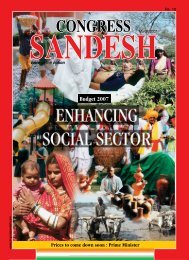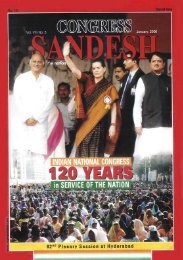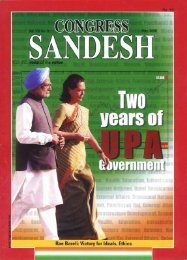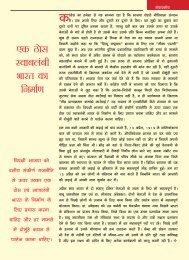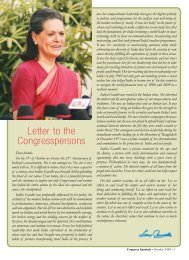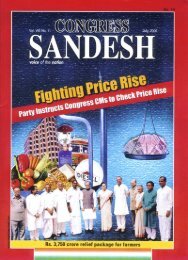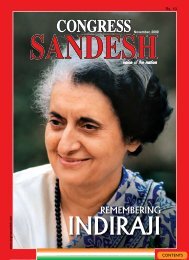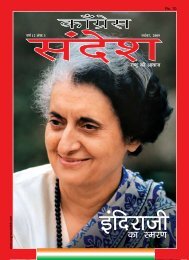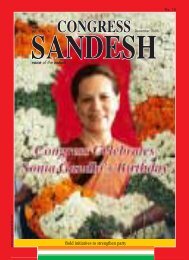CONGRESS SANDESH COMPLETES ITS SEVEN YEAR
CONGRESS SANDESH COMPLETES ITS SEVEN YEAR
CONGRESS SANDESH COMPLETES ITS SEVEN YEAR
- No tags were found...
Create successful ePaper yourself
Turn your PDF publications into a flip-book with our unique Google optimized e-Paper software.
Honouredby the legacy of our immediate past. Not just by the perceivednegative consequences of British imperial rule, but also bythe sense that we were left out in the cold by the Cold War.There is no doubt that our grievance against the BritishEmpire had a sound basis. As the painstaking statistical workof the Cambridge historian Angus Maddison has shown,India’s share of world income collapsed from 22.6% in 1700,almost equal to Europe’s share of 23.3% at that time, to aslow as 3.8% in 1952. Indeed, at the beginning of the 20thCentury, “the brightest jewel in the British Crown” was thepoorest country in the world in terms of per capita income.However, what is significant about the Indo-Britishrelationship is the fact that despite the economic impact ofcolonial rule, the relationship between individual Indians andBritons, even at the time of our Independence, was relaxedand, I may even say, benign.This was best exemplified by the exchange that MahatmaGandhi had here at Oxford in 1931 when he met members ofthe Raleigh Club and the Indian Majlis. The Mahatma was inEngland then for the Round Table Conference and during itsrecess, he spent two weekends at the home of A.D. Lindsay,the Master of Balliol. At this meeting, the Mahatma was asked:‘How far would you cut India off from the Empire?’ His replywas precise – ‘From the Empire, entirely; from the Britishnation not at all, if I want India to gain and not to grieve.’ Headded, ‘The British Empire is an Empire only because of India.The Emperorship must go and I should love to be an equalpartner with Britain, sharing her joys and sorrows. But it mustbe a partnership on equal terms.’ This remarkable statementby the Mahatma has defined the basis of our relationshipwith Britain.Jawaharlal Nehru echoed this sentiment when he urged theIndian Constituent Assembly in 1949 to vote in favour ofIndia’s membership of the Commonwealth. Nehru set the tonefor independent India’s relations with its former master whenhe intervened in the Constituent Assembly’s debate on Indiajoining the Commonwealth and said:‘I wanted the world to see that India did not lack faith inherself, and that India was prepared to co-operate even withthose with whom she had been fighting in the past providedthe basis of the co-operation today was honourable, that itwas a free basis, a basis which would lead to the good notonly of ourselves, but of the world also. That is to say, wewould not deny that co-operation simply because in the pastwe had fought and thus carry on the trail of our past karmaalong with us. We have to wash out the past with all its evil.’India and Britain set an example to the rest of the world inthe way they sought to relate to each other, thanks to thewisdom and foresight of Mahatma Gandhi and JawaharlalNehru. When I became the Finance Minister of India in 1991,our Government launched the Indo-British PartnershipInitiative. Our relationship had by then evolved to a stagewhere we had come to regard each other as partners. Today,there is no doubt in my mind that Britain and India are indeedpartners and have much in common in their approach to awide range of global issues.What impelled the Mahatma to take such a positive view ofBritain and the British people even as he challenged theEmpire and colonial rule? It was, undoubtedly, his recognitionof the elements of fair play that characterised so much ofthe ways of the British in India. Consider the fact that animportant slogan of India’s struggle for freedom was that ‘SelfGovernment is more precious than Good Government’. That,of course, is the essence of democracy. But the slogansuggests that even at the height of our campaign for freedomfrom colonial rule, we did not entirely reject the British claimto good governance. We merely asserted our natural right toself-governance.␣␣Today, with the balance and perspective offered by thepassage of time and the benefit of hindsight, it is possiblefor an Indian Prime Minister to assert that India’s experiencewith Britain had its beneficial consequences too. Our notionsof the rule of law, of a Constitutional government, of a freepress, of a professional civil service, of modern universitiesand research laboratories have all been fashioned in thecrucible where an age old civilisation met the dominantEmpire of the day. These are all elements which we still valueand cherish. Our judiciary, our legal system, our bureaucracyand our police are all great institutions, derived from British-Indian administration and they have served the country well.The idea of India as enshrined in our Constitution, withits emphasis on the principles of secularism, democracy,the rule of law and, above all, the equality of all humanbeings irrespective of caste, community, language orethnicity, has deep roots in India’s ancient civilisation.However, it is undeniable that the founding fathers of ourrepublic were also greatly influenced by the ideasassociated with the age of enlightenment in Europe. OurConstitution remains a testimony to the enduringinterplay between what is essentially Indian and what is6Congress SandeshJuly, 2005




